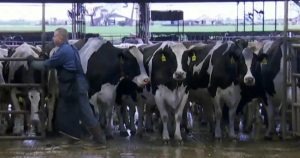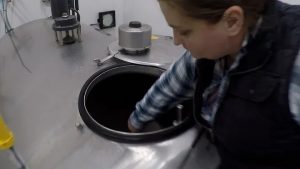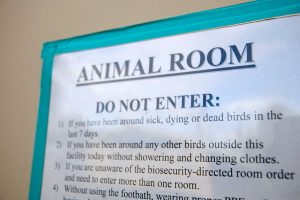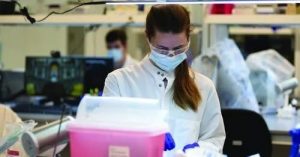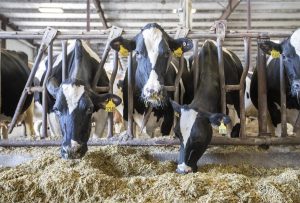
More milk products come from Tulare County, California than any other county in the U.S. Public health officials there are trying to guard against bird flu infecting humans.
Transcrpt:
AYESHA RASCOE, HOST:
This week, the USDA will expand its testing of milk supplies for bird flu. The virus has ravaged poultry flocks and cattle herds, and there’s been 60 reported human cases of it in the U.S. according to the CDC. More than half of those are in California. And although the virus doesn’t appear to be spreading between people, health officials worry it could evolve. KVPR’s Kerry Klein brings us the view from one California dairy county.
KERRY KLEIN, BYLINE: It’s a foggy afternoon in the central California city of Tulare. In a parking lot, county employees are handing out gloves, face shields and N95 masks.
UNIDENTIFIED PERSON #1: I’ll take some of the N95s too, then.
UNIDENTIFIED PERSON #2: Oh, N95?
UNIDENTIFIED PERSON #1: The masks, yeah.
KLEIN: It’s open to residents of two local counties.
(SOUNDBITE OF DOOR CLOSING)
KLEIN: They pull in and load up their truck beds with safety equipment known as PPE. Don Turner works for the Tulare County Public Health Department.
DON TURNER: You’re good to go.
UNIDENTIFIED PERSON #3: Thank you so much.
TURNER: You’re welcome.
(SOUNDBITE OF DOOR CLOSING)
KLEIN: It’s the agency’s ninth free PPE handout. Sean Roberts is one of the organizers.
SEAN ROBERTS: Two hours in, we’ve given out 37,000 pieces of PPE.
KLEIN: It’s one way the county and state are working together trying to contain avian influenza, along with testing dairy workers and milk. There are questions about exactly how humans are catching the virus, but health officials say it’s carried in milk from infected cattle, and dairy workers can be exposed during the milking process.
ROBERTS: The idea is that people who are working in direct contact with cattle, whether they’re infected or at a high risk to become infected if the cattle are, if they’re wearing PPE, it really minimizes the human exposure event.
KLEIN: California has reported more bird flu in humans and dairy herds than any other U.S. state, and the bulk of the state’s human cases have been here in Tulare County. It’s the top dairy-producing county in the entire nation. Take it from Juan Delezma. He’s a farmworker at a nearby dairy.
JUAN DELEZMA: (Non-English language spoken).
KLEIN: “If there are no cows, there’s no work,” he says. A water tower here was even made to look like a glass of milk. Bird flu was detected in California’s cattle in late August. Delezma says he saw cows get sick.
DELEZMA: (Non-English language spoken).
KLEIN: “Some of them looked like sleepwalkers,” he says. They looked damaged, and he and his co-workers wondered if they’d die. Cattle have died, but the state declined to give an estimate of how many. As for his own health, Delezma says he’s not too concerned. He’s gotten PPE from his employer. But farmworker advocacy groups say that hasn’t been everyone’s experience. Many aren’t aware of the risks of the virus and don’t have the PPE they need, according to Elizabeth Strater of the United farmworkers Union. Also…
ELIZABETH STRATER: We’ve heard from farmworkers and community members and veterinarians that symptomatic workers are clearly still working.
KLEIN: One reason, public health officials advise anyone with the virus to isolate until their symptoms improve. That may take longer than the five days of paid sick leave that the state generally requires employers to provide. The California Department of Public Health said by email that workers’ comp should cover more days off, but Strater says getting it approved is involved, which is a disincentive to get tested.
Tricia Stever Blattler is with the Tulare County Farm Bureau, which represents farmers. She also said farmworkers tend to keep their heads down.
TRICIA STEVER BLATTLER: They don’t want to lose pay. They don’t want to lose work hours. They don’t want to be in trouble with their employer. And they certainly don’t want to have the government know more about their life if they are here as an undocumented worker.
KLEIN: State health officials acknowledge that cases are likely being undercounted, especially since symptoms have been relatively mild. Meanwhile, state, county and federal health officials say they’re trying to get dairy workers to test more. A PSA on a Spanish-language radio station recently promoted a local testing clinic.
(SOUNDBITE OF ARCHIVED RECORDING)
UNIDENTIFIED PERSON #4: (Speaking Spanish).
KLEIN: It was a pilot clip organized by the Centers for Disease Control and Prevention, their first one in the entire country. The CDC didn’t share how many people showed up. Meanwhile, the virus continues to rip through California’s dairies, like Joey Airoso’s fourth-generation farm in Tulare County. On the worst day of his farm’s outbreak, he says more than 500 cows needed treatment.
JOEY AIROSO: It’s demoralizing. Yeah. From a morale standpoint, it’s hard to see that many animals not feeling good.
KLEIN: He says 14 of them died. But none of his employees have been sick yet, and he attributes that to all the PPE he got for free. For NPR News, I’m Kerry Klein in Tulare.
(SOUNDBITE OF MUSIC)
You can now read the most important #news on #eDairyNews #Whatsapp channels!!!
🇺🇸 eDairy News INGLÊS: https://whatsapp.com/channel/0029VaKsjzGDTkJyIN6hcP1K







